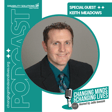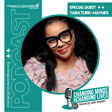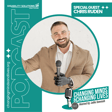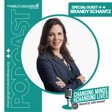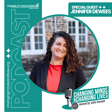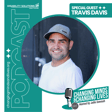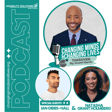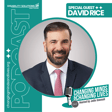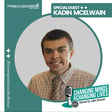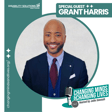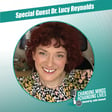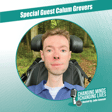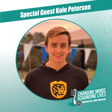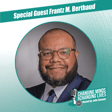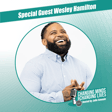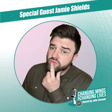Introduction of Julie Sobosh and Guests
00:00:00
Speaker
Welcome to another episode of Changing Minds, Changing Lives. my name is Julie Sobosh. I'm the founder and strategic advisor for the Disability Solutions team. I'm also the CEO of the Catch-22 group and now the job board doctor.
00:00:16
Speaker
If you have not seen all that transition, it's all out there on the LinkedIn's and we talked about it at length with Grant Harris, who is our last and just fantastic guest who talked to us about His experience is as an adult who is diagnosed in autism, who's also in the talent acquisition and workforce development and optimization space.
Inclusive Hiring and Personal Motivation
00:00:38
Speaker
Such a raw conversation and helped me, honestly, on a day that I needed it to hear, um, the the power in my neurodiversity, the the power in my mental my mental health disabilities.
00:00:50
Speaker
And so I just want to encourage you guys, go back, listen to Grants, check out some of our other episodes from late last year. Also very excited about some upcoming episodes. Holly O'Hearn is going to come back and we're going to talk about grieving in the workplace.
00:01:05
Speaker
um We have Caden McElwin, who's going to be joining us, who I am very pumped to talk to. and think it will be quite a feisty conversation between us. um But for today, i'm also very, very excited and very thankful that Ron Fish has agreed to join us on the Changing Minds, Changing Lives podcast um to have a conversation ah from his perspective as a global talent acquisition leader um who's also passionate about inclusive hiring, inclusive workplaces,
00:01:40
Speaker
and how to get there from a leadership perspective. And I will welcome you, Ron. Thanks for coming to the show. Yeah, thanks so much, Julie. I really appreciate. um I'm looking forward to the conversation.
00:01:53
Speaker
um And then just to ah highlight, so I am a global talent acquisition leader. I head up talent acquisition for a software company based in Utah, and um that's my day job. my My other job is that I also operate as an ambassador for disability inclusion, championing accessibility initiatives. And my larger goal, I guess, today is to really do more outreach in the ah HR and talent acquisition ecosystem to sort of suck my colleagues out there into, um you know, focusing on accessible hiring processes, building equity within hiring programs as well.
00:02:34
Speaker
That is amazing. and And just, you know when Ashley suggested you as a guest for the show. um one thing that we were very excited about is that you are a TA a leader.
00:02:47
Speaker
ah you you get The title says it all, right? Global Talent Acquisition. And you have such a unique position, i think, in our world right now to be able to influence other TA leaders because you've done the work, you understand scale, you understand how do we look at technology as both a opportunity and a barrier to employment. And as we move into a world where AI is going to be a a
00:03:18
Speaker
critical part of town acquisition and hiring processes, good, bad, or indifferent. and And I'm sure we can talk a lot about that. um Understanding what it means to actually implement hiring is is a huge value proposition. So I thank you for it for joining us.
00:03:38
Speaker
I guess the first question is, and I hope hope you don't mind it. I hope this isn't too personal, but how did you come to care about accessibility, disability inclusion as part of not just your day job, but your your second job as well.
Barriers and Universal Design in Hiring
00:03:55
Speaker
Yeah, and that's really a foundation to you know what I do today. And I'm more than happy to talk about that topic. So I have um a number of people in my family with disabilities. I grew up my whole life with my father being blind, um watched him struggle, navigate an inaccessible world, help him you know be an accommodation for him in some regards, but then also see him achieve some really great things.
00:04:21
Speaker
Then a lot of neurodivergence in my immediate family, wife and daughter with dyslexia, a son with ADHD, have seen them struggle. um Some significantly overcome those challenges to achieve success. So I would say that's the foundation for it. And then as I've encountered that.
00:04:40
Speaker
Seeing people encounter barriers within the hiring process, it's really resonated with me. And there have been a number of different um elements that have really led to me sort of going from um you know being inspired to make this part of the hiring programs that I build to really almost becoming obsessed with making sure that I'm looking at things from the universal design perspective and really building hiring programs that are accounting for way more than just you know, offering an accommodation if somebody happens to figure out how to get ahold of the right person kind
Commitment to DEIB and Legal Challenges
00:05:14
Speaker
of thing. Oh, bless you for saying that.
00:05:16
Speaker
I cannot, we have a running joke at Disability Solutions about how many accommodation lines we've called in our in ah auditing and never gotten an answer, gotten in of a voicemail that is like, hi, thanks for calling 67547, leave a message or this mailbox is full.
00:05:35
Speaker
to have a TA leader that thinks about that upfront and doesn't just think that this is a little side thing that may or may not be important, but that the true way to integrate talent with disabilities into your into your team, but also into your brand is to create a truly accessible experience from the hiring perspective.
00:06:00
Speaker
Thank you it for for saying that. So Tell me a little bit more about how then what's happening
00:06:12
Speaker
right now has sort of impacted the way that you are talking potentially or moving in this space. We're obviously in, and just for our listeners who might be listening to this later, we're in, in March of 25, we've had 11246, executive order 11246 revoked, which,
00:06:29
Speaker
eleven two four six executive order eleven two four six revoked which kind of took that stick away, not kind of did take the stick away around um affirmative action and and hiring from a from an accountability perspective. Section 503 still the law of the land. It's still a requirement um and that hasn't changed.
00:06:54
Speaker
So has any of this kind of landscape that we're living in now, has that changed your approach? And how are you moving in the space that might be a little bit different that can help our listeners understand, um you know, from your perspective as a global talent acquisition leader, how to continue to do the work in an environment that's not as conducive to the work as it was a year ago?
00:07:23
Speaker
it's a great question and it's on all of our minds. And I think it's been a gut check for everybody in this space when DEIB or DEIA becomes like a four letter word, right? And suddenly, um, we're faced with this.
00:07:37
Speaker
What I'll say is my company is committed to continue our efforts. Um, in in every regard. So our focus as a company is very much on um the gender diverse hiring side, um you know dealing with gender ah issues in the workplace, gender parity, as well as the accessibility side. So I've um had this like maybe crusade that I've been on um both from the standpoint of what I'm doing within my company, as well as the the public engagement I'm doing today and um with other webinars I'm putting on and so forth.
00:08:12
Speaker
um So I haven't really changed what I'm doing. I think it's important work. My company is committed as well um to our initiatives. um You know, maybe some subtle changes, some nuances. Obviously, OFCCP is not this big ogre behind every recruiter's back anymore, but Why change processes that have been working?
00:08:34
Speaker
And I hope that all of the good practices that have been employed, all of the the best practices that have been employed, continue to resonate with all of the hiring managers, all the talent acquisition leaders and ah HR leaders out there.
00:08:49
Speaker
So we don't you know go back to the 70s. We continue on the path we're on um And then we wait for everything to kind of shake out. But at this point, we're we're committed and we're still moving forward on our side.
00:09:01
Speaker
Yeah, I think, A, thank you for that. um and And I think that's you know such a ah good point. When I'm trying to think of the silver linings, one thing that I think is is very interesting is without the stick, so without the the enforcement mechanism of 503, how do we how do we look for opportunity?
00:09:27
Speaker
And I think one thing is exactly what what you said is there's there are brands that have been doing this work for a long time and are going to continue to do this work because they know that it is ah is a proper business decision for them to do so.
00:09:44
Speaker
um And they see the value in it. And then we're going to see on the other side, those who were performative, who did it while it was popular, who did it while it was, it was the sexy thing to do.
00:09:57
Speaker
um And then walked away when times got hard and not for us as a community. Those, our memories are not short. We are not goldfish. um and And we're going to recognize and keep track of who our true allies are.
00:10:14
Speaker
and how important it is that even though there is more nuance, I agree, we have to we have to make adjustments to to the world that we live in now, that there's still that commitment and the commitment is is important.
Ensuring Accessibility in Tech and Misuse of Systems
00:10:29
Speaker
um and And so let me kind of switch off of of that for a little bit and ask and ask you about how your commitment to accessibility and inclusion has influenced some of your decisions in your talent acquisition tech stack.
00:10:48
Speaker
Sure. um And, you know, part of my goal here is to show other talent acquisition leaders, HR leaders, how uniquely we're positioned to be able to make an impact, um both for employees. We know that 75% of the global workers don't tell their employers that they have a disability.
00:11:08
Speaker
So this ah this affects way beyond, you know, the one that um we may be aware of. So it's very important. So how do I account for it in our tech stack? We um we essentially offer accessibility at every stage. you know So we have paths for accessibility requests that are both specific to our communications when somebody applies.
00:11:34
Speaker
frequently asked questions around our hiring program. um We include these opportunities and I know that we don't have somebody not answering a phone because the primary mailbox that is um used for this purpose um is monitored by me.
00:11:52
Speaker
So um i know for sure people are getting responses and even to a fault, you know crazy story, we had somebody that, actually said they had a disability, later admitted that they didn't. They were just using the email address to try to further their candidacy.
00:12:09
Speaker
And it was a big um controversial post on LinkedIn, um but it was really interesting, like the flip side of it that I had never experienced before. So it was very unique. We clearly handled that um in as professional a manner as possible.
00:12:25
Speaker
But we try to account for this and in every way, make sure we have ah an accessible career site. We have done a lot of testing with web access tools as well as leveraging individuals that use assistive technologies from the Division of Services for the Blind um and other ah resources to ensure that we do have accessible tech stack, we have accessible applications and all of the other pieces there.
00:12:53
Speaker
So you you said something that um I'm going to use to hopefully prove to to make a point to our listeners. So you had an experience where someone, not a person with a disability, abused the system.
00:13:10
Speaker
Did you stop hiring people with disabilities after that? Oh, absolutely not. um You know, in fact, I'm more committed than ever. um And I think the the lesson for the the individual is to say, this is not a way to skip the line for anybody.
00:13:27
Speaker
You know, this is a way to ensure that we have equity in our process. So somebody who literally is, you know, part of the deaf or hard of hearing community that literally can't hear, on a video call wants to make sure that there's captioning available or that they can bring their sign language interpreter with them.
00:13:43
Speaker
That's what it's about. It's not about trying to give somebody an advantage or you know make sure that people with disabilities or ah from other diversity categories have an advantage. It's making sure that there's equity. So that was a hard lesson I think that individual learned. um I was happy to teach it. And um at at the end of the day, Julie, all of this stuff,
00:14:04
Speaker
raises awareness, brings visibility to exactly what you and I are committed to, which is um ensuring accessibility because individuals that are not aware of it or hadn't thought about it, they haven't um had their own disability or been part of a ah you know community of folks with disabilities,
00:14:21
Speaker
Sometimes they're just completely unaware. And once they are people usually, most people are empathetic. They have empathy baked into their personal values. So you just have to trigger that and ensure that people are, um you know, moving forward in in that direction and and they're aware of what's happening around them.
Misconceptions and Global Inclusion Efforts
00:14:40
Speaker
Yeah, I think you make two two good points. One is that there is so much misperception about why these types of programs exist, that people who are not a part of a non-disabled non-white or non-disabled white community may not understand that these are not programs, these are not laws or or regulations that are driven to keep them from opportunities or to provide us with a hand up. It's really just to make the playing field level um or as level as possible because even sometimes if I have to call and ask for an accommodation,
00:15:28
Speaker
That still isn't level, right? I should be able to apply through the regular process. It's just an opportunity for me to continue down the apply process. It's it's not a step up.
00:15:39
Speaker
Absolutely. In fact, one of you know so one of the watershed moments for me that took me from like knee deep because I had people with disabilities in my family and was always sort of conscious of it in our um you know hiring programs that i built.
00:15:53
Speaker
When I found out that at my current company that literally our career site was eliminating people with disabilities because it wasn't accessible, neither was our entire corporate website. That was a watershed moment for me where I was like, oh my, like I didn't hadn't even considered that that might be the case. And when I found it out, you know, I went on a a mission to make sure that we fix that, which we've done. We've brought it to ADA compliance today.
00:16:19
Speaker
um But yeah, that was really a shocking moment for me that really, again, pushed. It was almost like somebody shoved me. I had my toes in the water. Somebody shoved me in.
00:16:30
Speaker
And I'm like, i'm I'm uniquely positioned here. I can make an impact. And I i plan to. so Yeah. No, that i mean that's that's fantastic. And and you had and the other kind of takeaway that we hear a lot in from corporate leaders even still today as well.
00:16:46
Speaker
had a bad experience hiring or hiring a person with a disability or I hired a person with a disability and they didn't stay forever. So that must mean I can't hire people with disabilities. And what you had was an experience um where someone abused the system and it's kind of easy to to anecdotally go, well, you know what, this isn't, this isn't going to work.
00:17:04
Speaker
um And you stayed the course because you understand that one non-successful hire or one abuse from the system is not reflective of the value of the work and it's in its entirety or reflective of the community as a whole.
00:17:22
Speaker
Absolutely. There are always going to be bad actors. I mean, I get text messages telling me that I owe money or you know some other scam. So there's always going to be somebody that tries to find a loophole in the system. And you just have to understand that and and stay on task. And that's really what we've done here.
00:17:40
Speaker
Yeah, no, that's that's fantastic. What about, um yeah so do you have for, or have you done work that's non-US for the disability community or or talent acquisition? Yeah.
00:17:56
Speaker
Yeah. In fact, we have really stitched this thing together globally. you know So when I'm a global talent acquisition leader, we are ah disability confident, um certified in in the UK.
00:18:08
Speaker
We have um a lot of partnerships in India as well. We've built a couple of ah computer labs for students at um a couple of the blind schools, like the National Institute for the Blind in India.
00:18:20
Speaker
So we have definitely done a lot of work. We're also, you know, working across like Singapore, Australia, and others. We've got partnerships with the RNIB in the UK, which is the Royal National Institute for the Blind, I believe is the expanded acronym.
00:18:37
Speaker
um But we've got a partnership with them. We're um working to get them to certify our website. um Certainly the ADA seems convinced, so we're trying to convince them as well.
00:18:47
Speaker
um But we're enjoying a lot of partnerships globally, definitely far beyond just the U.S. That's really fantastic. and And I think something that a lot of the leaders that we talk to are are very passionate about is you know, it's great that we're doing things in the US, but how do we figure out how to do things that are in the other countries where we, you know, work and live as as a community?
00:19:13
Speaker
How did you approach that? How did you say, okay, this is something that we're committed to as a company. Great, let's do it. um Then how was the how did you take the approach? is it Is it an overarching strategy and then a nation by nation implementation or even a region by region implementation? Can you talk a little bit more about that?
00:19:32
Speaker
So it's some of a lot of things. So what I'll say is that um when you're a global company that you know, as in in many countries, you don't always know what everybody else is doing. So as I became this accessibility champion, I began to be looped into things that were happening. So I can't take credit for everything the company has done. There certainly have been a lot of other people here that have been part of that. So what I learned is that our HR leader in India was promoting some of these
00:20:05
Speaker
um sort of humanitarian initiatives or accessibility initiatives. So really for me, it was more about, some of that was about understanding what we're doing as a company and then elevating that to ensure that like our executive leadership was aware of all the great work we're doing. Cause I get everybody really interested in accessibility, disability inclusion.
00:20:27
Speaker
And then as I learned about some of the other things that we've done, we then expanded. So um I can't take credit for the computer labs in India. Certainly, that was our um great HR leader there that saw fit to do that. But that began to help us stitch this together.
00:20:42
Speaker
um The work that we've done in the UK, I've got colleagues there, a woman named Faye that's been a great advocate and ally supporting those initiatives, kind of driving things from that region perspective.
00:20:54
Speaker
as well as other locations. So I would say it's a joint effort. Some of it is just becoming aware what we've of what we've been doing globally. But from the hiring program perspective, I definitely have been the catalyst there driving um a globally accessible hiring program. So we're ensuring that we have consistent processes, universal design of our hiring program, and that we're employing those best practices globally.
00:21:21
Speaker
so And are you using different tech stacks in different countries? No, in large part, as far as our hiring process, it's the same tech stack. So it's our applicant tracking system, accessible um you know application process.
00:21:38
Speaker
And then so the the individual that I mentioned earlier that pretended to have a disability but didn't was actually based in India. So that was in a US. s So that was part of our global um accessibility program.
00:21:51
Speaker
you know, ah process, I guess, um that routed and funneled that to me because I want to drive that individually to make sure that we are in fact providing equity. And most importantly, um when we have accommodations requested, we're ensuring that we're coaching the other hiring stakeholders, right? Like our recruiters if needed, or we've done that, but also the individual hiring managers to say,
00:22:16
Speaker
here's what you can anticipate in the interview, and oh, by the way, this person um is deaf or hard of hearing or some other disability, why don't we do an extended interview time?
00:22:27
Speaker
you know Let's do 90 minutes instead of the standard 45 minutes or an hour to ensure there's plenty of time and nobody's looking at the clock or in a hurry because communication will happen on a different cadence for that. So it gives us that opportunity opportunity for coaching.
00:22:43
Speaker
And I kind of, you know, keep a tight hold on it to ensure that we are able to provide equity.
Coaching and AI in Talent Acquisition
00:22:49
Speaker
So I think that's that's really fantastic. That one-to-one coaching is so critical um when we're helping people who are are not disabled to be able to understand how to comfortably engage. Because I think a lot of times the reason that we avoid situations with people who are different with us is simply because we're afraid to offend them.
00:23:11
Speaker
We're afraid to muck it up is one of my favorite sayings. and And we're just not comfortable in how we're supposed to act um with someone who looks, thinks, or feels differently.
00:23:23
Speaker
um So thank you for that. is there Would there be any like takeaways that you have from that coaching that you've done that say, if I was going to implement a large-scale training about what hiring managers need to know, would what would be like a couple of things that you would say, this has to be included?
00:23:42
Speaker
By far and away, Julie, of everything I've done, i think the biggest impact has been made by just simply raising awareness. We have a global accessibility club as well. You might not be surprised to hear it was four or five people when I got involved. I didn't start it. It was started by um a woman on our UX design team.
00:23:59
Speaker
Um, it now is over 125 people that are part of that ecosystem. So it's super exciting, but I would say just raising the awareness. And again, the coaching is really more to just have a discussion.
00:24:11
Speaker
If I'm trying to walk in the door of a building and somebody runs into me, my immediate reaction is like, what are they doing? But then if I look over and see a cane and realize they're blind immediately, I'm going to be like, Oh my gosh, you know, is there any way I can help you sort of thing?
00:24:26
Speaker
And I think most of our managers have reacted just that way to say, thank you for letting me know this. So I wasn't you know aware that this person was autistic. I'm going to absolutely let them turn off their camera um if they're most comfortable, you know, or I'm going to start. And one thing we recommend to best practices, start every interview with something along the lines of, is there any way I can optimize this interview experience for you today before we get started?
00:24:52
Speaker
you know, and just simply put it out there. It might be, um you know, somebody that just says, can I refill my water glass real quick? I've been talking a lot today. Or it might be somebody who's like, hey, can we test captioning?
00:25:03
Speaker
Would you mind just talking while I test captioning? So it could be something, um but it ultimately is, it makes a better experience for everybody. And I think that's what accessibility does.
00:25:14
Speaker
I love that word optimize, right? it it I dislike the word accommodation because it it's, us giving, it's it's very charitable and it's in its demeanor, at least to me.
00:25:28
Speaker
Optimize is how do we both get most out of this? How do i figure out how that we can be most successful together? I think that's a ah great word. So the the kind of last question I want to focus on is we go to a lot of TA tech conferences, HR tech conferences,
00:25:49
Speaker
blah It's that time of the year, right? it's It is conference season. And every every booth ah that we go to has ai splashed in big letters, artificial intelligence, machine learning, blah, blah, blah.
00:26:03
Speaker
And I'm excited about AI. like i'm ah I'm on the train. I want to be cool. um What we haven't seen roughly in the last five months is a conversation around ethical AI. And what I was very excited about in 23 through late 24 was that the majority of conversations that I was seeing had it had an ethical component to it.
00:26:28
Speaker
And so as you're thinking as as a global talent acquisition leader, I need to hire smarter, I need to hire faster, I need to hire more efficiently, i i won't say cheaply, but more efficiently. um And you're thinking about how AI fits into your tech stack.
00:26:48
Speaker
What are some of the the questions that you're asking or some of maybe the concerns that you have when you're talking to a vendor about how AI is being implemented in the technology? Yeah, and it's good. I'm having conversations like this pretty regularly as a talent acquisition leader to ensure that we are embracing AI.
00:27:07
Speaker
You know, this is not unlike a lot of the evolutions we've seen in the talent acquisition space. I used to be what we would call a headhunter, you know, back in the day, and we were proud to be headhunters. We were like the best investigators in the world.
00:27:21
Speaker
um Then you know this thing called the internet happened. um you know And then came along fax machines and email and all of the other things that came along with it. So there have been a lot of evolutions and I've told people, don't panic.
00:27:33
Speaker
you know This isn't the first change that's happened and we're still here. But at the end of the day, do we need to embrace it? I firmly believe we do because I think that there are a lot of high volume, low value tasks that can be automated.
00:27:45
Speaker
And, um you know, that'll be a big benefit. It'll give bandwidth to the recruiters and free them up to be more strategic, to have those longer, more meaningful conversations with hiring stakeholders, with candidates and so forth.
00:27:59
Speaker
So I've had some experiences over a number of years with, you know, what was called AI or automation and have seen a lot of money go out the door without a lot of ah ROI. Yeah.
00:28:13
Speaker
So the questions that I'm asking are, um you know show me your demo. you know This is great. you know this is I'm seeing these um technologies that bolt into your ATS that stack rank candidates. We get more candidates than ever, 300 applicants per job.
00:28:29
Speaker
And it stack ranks the candidates. Well, my question is, Can we do a pilot? you know Is there a back out clause if this doesn't work? Because I've just been part of things that have not really been all they're cracked up to be. They're sort of half-baked. So I'm not asking our the half-baked question because I don't wanna insult anybody, but at the same time, um a lot of my questions surround, you know do you have customer references that can speak to the value they've gotten out of this?
00:28:56
Speaker
Can we you know do a pilot or is there a back out clause really looking at these technologies? But I'm seeing a lot of really exciting stuff that absolutely is going to you know do those tasks we don't like. i mean, hopefully, AI eventually will do our laundry, clean our house and free us up to just you know be on the phone with our friends and manage our personal relationships.
00:29:18
Speaker
But um you know seeing a ah lot of um very, very interesting AI, you know we'll see if it actually can accomplish and achieve what it's said to be. i'm Also looking at conversational AI that can do every screening, do screening at scale, screen a thousand people you know in a condensed period of time.
00:29:37
Speaker
um Those things are all super exciting. Do they work? I think it's um yet to be seen.
Contact Information and Guidance Offer
00:29:42
Speaker
Hopefully um we can get some ah ROI from it. Great. So thank you so much. I'm going to put this interview just on repeat for ah many of our our clients and prospective clients who are really committed and passionate about this work, but need to hear from other TA leaders about how it gets done at scale.
00:30:03
Speaker
um As we wrap up, I always ask two questions. ah The first is, what is something that someone has done for you in your life that has changed your life as personal or personal?
00:30:14
Speaker
not personal as you want to share. Sure. And I'll um you know just say, I feel like in a lot of ways, the work I'm doing is sort of from my father's legacy. He passed away in 2019.
00:30:26
Speaker
He was blind my whole life. um He was blinded in a car accident um when his face impacted the steering wheel he had on glasses before they had shatterproof lenses. So from 19 on, he was blind.
00:30:39
Speaker
I would say, you know, what has been lasting with me is watching him overcome challenges. you know, him being the first blind student at Penn State University, graduating with a master's degree.
00:30:53
Speaker
landing a job as the director of a housing authority, later starting his own business when he was working for the Blind Association of Western New York and they closed the doors of their file folder company and him sort of picking that up on his back, finding funding and reopening it um as Blind Industries Incorporated. So I would just summarize it by saying that watching my dad achieve things as a a blind individual who has everything against them and see him overcome it and it not be a barrier for him or the barriers that are there, he bulldozed through them has been inspirational for me for sure.
00:31:33
Speaker
Amazing. Thank you for sharing your dad with us today. And last question is, what is something that you would tell someone in your shoes that would help change their minds about the talent value that we bring to their workforces?
00:31:50
Speaker
Yeah, I think, and I said it earlier, I believe talent acquisition leaders, HR leaders are uniquely positioned to be able to make an impact here. And because so many people don't disclose a disability, we have many, many more people at our organizations that could benefit from, um you know, we don't like the word accommodations per se, but benefit from accessibility requests, being able to acquire software that would be beneficial for them if it's speech to text or...
00:32:19
Speaker
a screen reader, things that don't cost a lot of money. And I think that's the big thing. Employers think, oh, hiring somebody with a disability is going to cost me a whole lot of money when the reality is most of those things, even building talent acquisition programs with accessibility in mind, it doesn't cost any money.
00:32:38
Speaker
It's just designing from that universal design perspective. So I think one of the big myths is absolutely that this is going to cost a lot. um as opposed to, um you know, it's it not really costly.
00:32:52
Speaker
um And it just makes a ah better um environment for everybody at the end of the day. Amazing. So if someone wants to connect with you, Ronfish, how do they find you? Hit me up on LinkedIn. I'm pretty active out there. um I'm certainly always on a campaign around accessibility to spread the word.
00:33:11
Speaker
um So feel free to reach out to me on LinkedIn. I've got some other um you know articles and things I've written on the topic on ERE media. as well. um But feel free to hit me up, send me a friend request. um And I'm also always happy to connect offline, you know to have one-to-one discussions, to provide tips, um information, and that kind of thing for anybody out there that's in a a similar position to me or just wants to know more.
00:33:39
Speaker
I'm always happy to help out. So that's an open invitation to your listeners to but feel free to reach out. And hope they will take you up on it. Ron Fish, Global Talent Acquisition Leader. Thank you so much for joining us. Thank you for this perspective that we need to hear right now and and for doing the work that you do and carrying on your dad's legacy to make an impact that that does in fact change lives.
00:34:03
Speaker
Thanks for the opportunity, Julie. i appreciate the conversation.

